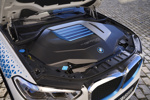The firm operates more than 600,000 vehicles across Europe, which means it sees thousands of cars defleeted each year.
Until four years ago, cars that had finished their life in the business world were sold on in the condition that drivers returned them in. Consequently, they weren’t always in the greatest nick.
Kerbed and grimey wheels, dents in doors and scrapes on bumpers meant buyers were reluctant to pay top money for cars covered in eyesores.
So in 2002, Arval turned to auction house Manheim for help in boosting the value of the cars being defleeted. Manheim suggested using the services of its smart repair subsidiaries – bodywork specialist Dent Wizard, paint experts Flying Colours and alloy refurbishers Wheel Wizard.
Scott Holland, Arval’s head of remarketing, says the time and investment in rigorously assessing which vehicles would benefit from smart repairs was well worth it.
He said: ‘We wanted to maximise what we could get for the vehicles and to do that you sometimes have to invest a small amount. We did that, and we get over and above that back, not always just in financial terms but also in time and fast sales.
‘The benefits are the speed of getting the vehicle reconditioned up to retail condition and also costs – there’s now no need for the vehicles to go off to the bodyshop.’
Arval focuses on external smart repair on bodywork and alloy wheels. It’s refurbishing the latter that Holland says has the most dramatic effect.
‘Alloys are very important as they are fundamental to the look of the vehicle,’ he says. ‘After 70,000 or 80,000 miles, road grime eats into the wheels and they sometimes get curbed. With the refurb it really does change the look of the car.
‘There are things like dents in the door from where it’s been parked in the car park, bumper scrapes and stone chips. Things like that take the buyer’s eye and we want them removed.’ Holland says smart repair got rid of such blemishes quickly and efficiently, and buyers certainly noticed the difference.
‘We get a better reputation,’ he says. ‘We saw buyers following our vehicles because they knew they could get them straight on to the forecourt.’
All of the inspection and repair work is carried out by Manheim, leaving Arval staff free to do other things. But efficient smart repair is not simply a case of fixing every problem with the car. Holland says that if there was a serious defect then nothing was fixed, as repairs were only carried out if the overall appearance of the car was enhanced.
‘Say we have a vehicle that has a few car parking dents and a couple of bumper scuffs,’ he says. ‘We will spend £75 to £100 getting something done and expect to see our return on that to be about 120%, plus we sell the car first time.
‘But anything like a stone chip that’s gone rusty, or anything too large – say about 10.5cm in diameter – we won’t bother, as it’s not cost-effective. Work like that would require a full bodyshop service, which is more expensive.’
While the results of smart repair can be seriously impressive, it can’t work magic, Holland warns. ‘There are also limits to what you get from it,’ he says.
‘For example, we don’t like smart repairing our bonnets as it’s difficult to get the paint colour the same on stone chips.’
Issues and nuances like this mean it’s important to consider how the repairs you make will affect the price of a particular vehicle.
‘You can’t go ahead with any work and think straight away that it’s going to make a difference,’ Holland says. ‘You have to do the repair so the buyer can’t tell there has been a repair to it. You have to always aim to return it as good as new.’
The financial return to Arval since it introduced a policy of smart repair has been considerable, not just in immediate terms. As well as improved residual values, cars sell faster thanks to the firm’s reputation for quality vehicles. This reduces the costs of re-entering vehicles for auction when they don’t sell.
Benefits at a glance















Login to comment
Comments
No comments have been made yet.